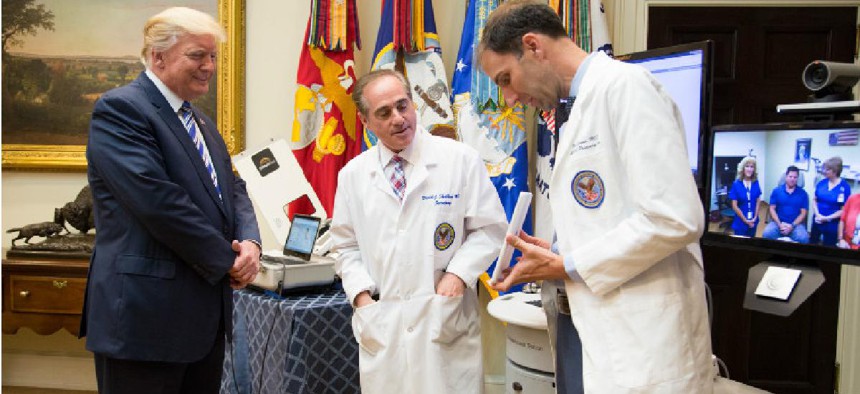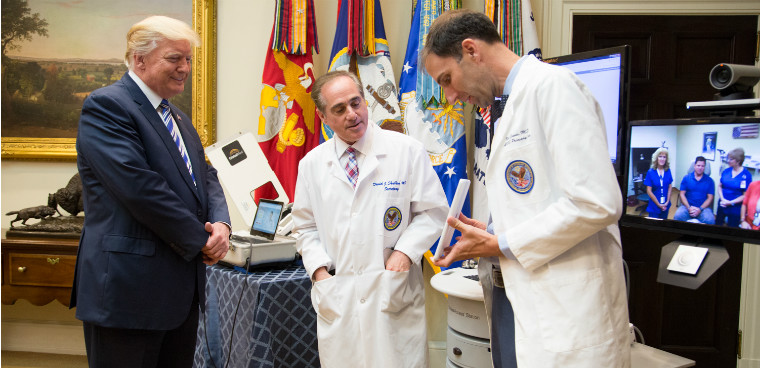Shulkin out as VA chief

After weeks in limbo, President Trump announced that Dr. David Shulkin would no longer be serving as Veterans Affairs secretary.

VA Secretary David Shulkin shows off a telemedicine app to President Trump, in happier days.
Dr. David Shulkin is out as the secretary of Veterans Affairs.
President Donald Trump announced on Twitter that Adm. Ronny L. Jackson, currently Trump's White House physician, will be taking over the post.
Robert Wilkie, the Department of Defense's undersecretary for personnel and readiness, will be serving as acting VA secretary during Jackson's nomination process.
"I am thankful for Dr. David Shulkin’s service to our country and to our GREAT VETERANS!" Trump tweeted.
While Shulkin delivered some early wins to the Trump administration in 2017, including the decision to abandon VA's homegrown Vista electronic medical record system in favor of a commercial platform, Trump loyalists inside the department were at odds with Shulkin over how much of the VA's medical services to outsource to private care.
The electronic health record contract with Cerner, expected to total $10 billion over 10 years, is still not signed, according to a VA source. Money to support the deal was included in the recently signed fiscal year 2018 omnibus.
Shulkin, who had served as VA's undersecretary for health during the Obama administration, had pledged repeatedly at hearings that he did not plan to preside over the privatization of VA care. His standing diminished under the Trump administration over the past few months, in part because of a travel scandal. He came under fire for an adverse oversight report that was highly critical of his use of government funds to include his wife on a trip to Europe.
As a result, Shulkin found himself isolated from the White House and even some of his own staff, and was reportedly seeking authority to fire some political appointees.
Shulkin was well liked on Capitol Hill, where he was seen as making inroads against some of the VA's most entrenched problems, including legacy technology.
"Dr. Shulkin has made a tremendous impact toward improving the lives of veterans during his time at the U.S. Department of Veterans Affairs. He has been instrumental in all that we have accomplished in the last year, and I thank Dr. Shulkin for his dedicated service to our country and our veterans," said Sen. Johnny Isakson (R-Ga.), the chairman of the Senate Veterans Affairs Committee. "I look forward to meeting Admiral Jackson and learning more about him."
Some veterans groups raised concerns about the future of VA.
"Our two million members are opposed to any legislation, or effort, to close or privatize the VA health-care system, and we will continue to work vigorously to ensure our nation's veterans have the efficient, transparent and properly functioning VA that they deserve," said Denise H. Rohan, national commander of the American Legion.
Joe Chenelly, executive director of AMVETS, said, "I am deeply concerned about the nominee. Veterans' lives depend on this decision, and the Trump administration needs to substantiate that this active-duty Navy officer is qualified to run a $200 billion bureaucracy, the second largest agency in the government."
Jackson has served as White House physician since 2006, and treated Presidents Bush, Obama and Trump.
NEXT STORY: Navy axes CIO office in reorg



